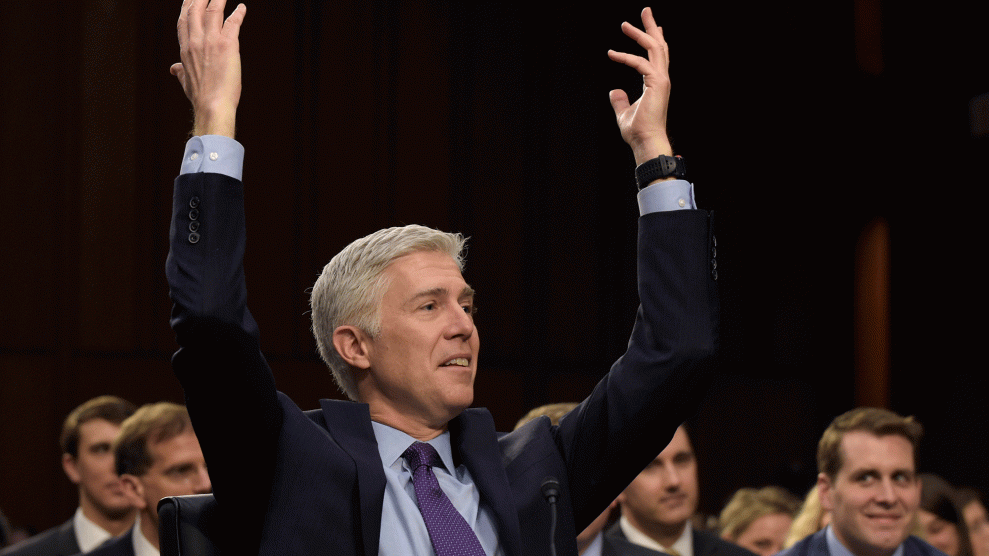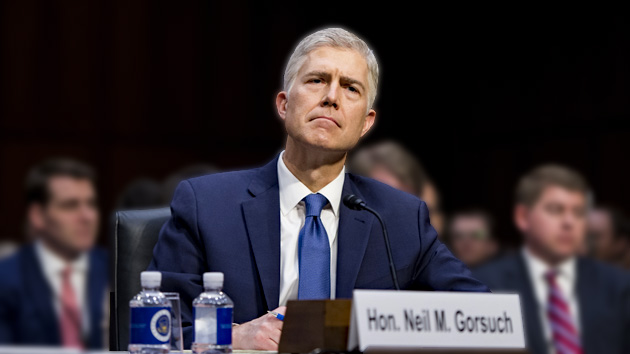
Supreme Court nominee Neil GorsuchSipa USA via AP
One of the main jobs of Republicans on the Senate Judiciary Committee this week has been to deflect attacks on Supreme Court nominee Neil Gorsuch by Democrats, who are trying to paint him as a tool of corporations and a foe of the little guy. To that end, Republicans have tried both to humanize the federal judge and to highlight the parts of his background that might make him more relatable to the average American. They’ve got him talking about the Denver rodeo and mutton bustin’ and quoting David Foster Wallace.
But those humanizing efforts are falling a bit flat. That’s largely because when it comes to demonstrating all that he has in common with the regular folks who might come before the court, Gorsuch is his own worst enemy. A graduate of Georgetown Prep, Columbia University, Harvard Law School, and Oxford, Gorsuch is the son of Ronald Reagan’s Environmental Protection Agency chief and spent most of his formative years inside the Beltway, including a stint as a clerk on the DC Circuit Court of Appeals. His nomination to the 10th Circuit Court was championed by the secretive billionaire Phillip Anschutz, his former client, and Gorsuch co-owns a Colorado mountain cabin with two of Anschutz’s top deputies.
On Tuesday night, Sen. Jeff Flake (R-Ariz.) asked Gorsuch about how he “liked to get his hands dirty.” If Flake was hoping to reveal a nominee who subscribes to Family Handyman and loves power tools, he was disappointed. The judge responded by reminding the committee how much he loves to ski. (Gorsuch was on the slopes when he learned about the death of Justice Antonin Scalia, whose seat he’s been nominated to fill.) “I always say the family that skis together stays together,” Gorsuch had said earlier in the hearing. Gorsuch told Flake that his daughters were “ferocious double-black-diamond skiers,” and at that very moment, one of them was doing some backcountry skiing near Telluride.
The exchange was unlikely to help most Americans relate to the judge. Today, skiing is largely a sport of the wealthy. A one-day lift ticket at Winter Park, the Colorado resort where Gorsuch said he liked to go, costs $144. A single day of skiing for a family of four could cost nearly $600, not including all the gear and lunch at the lodge. And teaching kids to ski so they can become “ferocious double-black-diamond skiers” is an enormous investment. A single day in the Winter Park ski school will set you back $189 for one child, not including equipment rentals. For most of the country, even with discounts for locals, those costs put skiing largely out of reach.
Earlier in the hearing, Sen. Mike Lee (R-Utah) had asked Gorsuch about his experience in politics. “Are you a lawmaker?” Lee asked. “Have you ever held a position as a state legislator? Have you ever held a position as a member of Congress?” Gorsuch responded with a chuckle, “I’ve served on my kid’s school board.”
The following day, Flake asked Gorsuch about his civic involvement outside of the court, mentioning his school board service. “Boy, that I found taxing, and loved every minute of it,” Gorsuch said. Flake nodded appreciatively, telling Gorsuch, “That typifies the West. People get along. They have to. On a school board there’s no passing the buck there. You’ve gotta make decisions. Local government is like that.”
What Flake seemed to have missed, though, is that Gorsuch never served on a public school board. He was on the board of the Boulder Country Day School, a small private school with tuition that runs from $15,000 to $20,000 a year. That’s a big difference from serving on a public, elected school board just about anywhere in the country.
In fact, Gorsuch is among the most privileged individuals to be nominated to the Supreme Court in recent memory. Justice Clarence Thomas grew up poor in Pinpoint, Georgia, speaking Gullah. His idea of a good time is camping in a Walmart parking lot in his RV en route to a NASCAR race. Sonia Sotomayor hails from a Puerto Rican family and grew up with a single mom in a South Bronx tenement. Samuel Alito is a Jersey boy, the son of Italian immigrant teachers, who graduated from a public high school. At first glance, Gorsuch’s background somewhat resembles that of Chief Justice John Roberts Jr., who likewise comes from a tony private-school background—except that Roberts worked summers in a steel mill to pay his way through Harvard.













